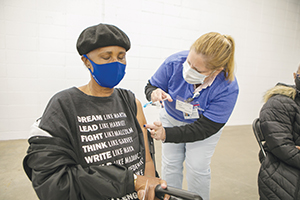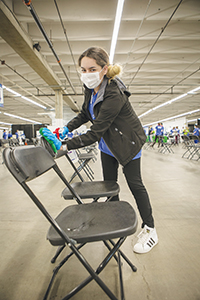By LISA EISENHAUER
When Colorado Gov. Jared Polis asked SCL Health in January to lead a one-day mass vaccination event for some of the residents of the state who were most vulnerable to COVID-19, Lydia Jumonville, the system's president and chief executive, says there was no hesitation.

One relative arranged vaccine appointments for 11 of her family members age 70 and older, including these three individuals resting after getting vaccines at a mass vaccine event run by SCL Health at the National Western Complex in Denver on Feb. 6.
A team within the system chose a date, secured a site, set up an online registration process, crafted a communications strategy, coordinated with community groups to arrange transportation and recruited hundreds of volunteers, all within a few weeks.
The Feb. 6 vaccination drive at the National Western Complex, a convention space in Denver, got shots into 5,000 arms within 10 hours. If SCL Health had had enough vaccine, Jumonville is confident 10,000 people could have gotten shots. "I think the efficiency of what we planned blew us away a little bit," she says.
The event was the first of two parts, with the process set to repeat on March 6 to give the booster shot.

A patient closes her eyes as an SCL Health volunteer administers a COVID-19 vaccine at the system's first mass event Feb. 6 in Denver. Members of underserved communities and communities of color were specifically invited to the event.
Part one went so smoothly that SCL Health has been circulating the master plan for organizing its event to others, including health systems, government agencies and community groups. "We're happy to share our playbook with anybody," Jumonville says. "We want to get everybody in this country vaccinated as quickly as possible, especially those who are most vulnerable and have been most impacted by COVID."
While other systems have staged similarly large drive-thru vaccination events in Denver, SCL Health's was unlike those in that it was an inside event. People didn't have to have a car or a companion with a car to attend. Groups that the health system worked with arranged transportation — including buses, shuttle vans and Lyft service — for patients who needed it. Accommodations were in place to assist those using walkers and wheelchairs.
Speed and agility
The indoor venue also meant that patients didn't have to sit in cars and workers didn't have to be stationed under tents on a parking lot for hours.
The mass event fit nicely into the vaccination strategy that an SCL Health team that includes pharmacists, doctors, nurses and communications specialists began crafting months before the first vaccines got federal approval. The goal has been to move as quickly as possible to get the system's frontline workers inoculated and then pitch in on the public effort, with a special focus on those who are eligible but with limited access to vaccination sites.

A volunteer sanitizes chairs during SCL Health's mass vaccination event. Hundreds of the Denver-based health system's associates volunteered to assist at the Saturday event.
As of Feb. 24, SCL Health had administered 100,000 shots to its associates and the public. Jumonville credits that number to an agile team that moves swiftly to ensure that whatever supply is available gets put to use.
"One of the things that improved in our system the minute COVID hit in March, is that we found out we need to be very flexible, and most of us move a lot faster and make decisions a lot more quickly than I think we had done in the past," she says.
An example of a decision that came about quickly was one made in response to an uptick in last-minute cancellations or no-shows, which Jumonville attributed to people putting their names on various lists or making multiple appointments for shots. In response, SCL Health set up a "rapid-call list" that patients who hadn't been able to secure an appointment can put their names on. If at the end of vaccination events there are leftover doses, the system contacts patients on the rapid-call list who live within 15 minutes of the sites. The remaining doses are prioritized for those who meet state eligibility requirements.
Educating associates
At the end of 2020, before the vaccine rollout began for SCL Health associates, system leaders posted and emailed to them educational material about the safety and efficacy of the vaccines. Workers could attend online meetings that featured Jumonville and other system leaders discussing the process and answering questions.

SCL Health associates prepare for a stream of patients at the check-in points at the entrance to the mass vaccination clinic on Feb. 6. The event took place at the National Western Complex, a convention space in Denver. In 10 hours, 5,000 people were inoculated.
Megan Mahncke, senior vice president of marketing and communications and president of SCL Health Foundations, helped craft that education effort. She says it hasn't taken a hard sell to get most associates who have been caring for patients with COVID to get the vaccine.
"I think our frontline workers have seen what COVID has done, so everyone was really responsive and just grateful for the opportunity to be vaccinated," Mahncke says.
The first vials arrived at SCL Health's St. Joseph Hospital in Denver around 3 p.m. Dec. 15 and by the end of the day nurses had given hundreds of shots to frontline workers. SCL Health said in late February that the overwhelming majority of its associates across its eight hospitals and more than 150 clinics had been vaccinated.
As the public rollout began, SCL Health expanded and diversified its education strategy for the communities it serves across Colorado and Montana. The system added a section on vaccine resources to its website with explanations of the eligibility rules in both states and links to where patients can sign up to be notified of vaccination opportunities. That information gets constant updates as the states revise their eligibility guidelines and as an increasing vaccination supply allows SCL Health to offer more opportunities for shots.
Removing barriers
The health system has posted information from its own experts and other trusted sources on its social media channels. It's sent letters and made phone calls to its patients who are eligible for the vaccine to tell them how to sign up and to answer their questions.
To reach minority communities that have proven to be especially vulnerable to the infection, SCL Health has worked with churches and organizations that serve those populations. The partners have helped provide education and access to vaccines through webinars, meetings and pop-up clinics. In addition, the system has sought out "community influencers," such as pastors, teachers and neighborhood organizers, to get vaccines and speak out about their safety.
"We've tried to remove barriers for vulnerable populations," Jumonville says. "We've had teams go out to their churches and physicians talk to them and answer their questions about the vaccine. We have Spanish-speaking providers who've gone out to meet with people in their environment to help them get comfortable with the vaccine itself and also with the process to get them vaccinated."
The big event
SCL Health used the same strategy of partnering with community groups to reach out to residents when it began planning its mass vaccination drive in Denver that targeted vulnerable residents who were 70 or older. Mahncke says about 40 nonprofit groups were tapped to help spread the word, register eligible residents and transport them to the event.
It took the combined effort of about 600 volunteers — including coordinators, clinicians and escorts — to pull off the event. Most of those volunteers came from SCL Health.
Mahncke says she and other SCL Health leaders were uncertain how associates would respond when asked if they would donate their services for the Saturday event, especially given that they'd been under intense stress for a year because of the pandemic.
"Within two hours, we had over 500 of our own associates volunteering for this event, which just floored us," she recalls.
Organizers planned the event precisely to avoid lines and to ensure social distancing. They arranged specific arrival times for patients, kept entrances and exits separate, set up pairs of chairs for the patient and a companion a safe distance from others, and moved each patient through the process, including a required post-shot observation of 15 minutes, in about 30 minutes.
Tears and gratitude
Mahncke and Jumonville were among the "goodbye greeters" who saw patients off. "It was one of the most moving things I think we've ever been a part of because for the patients coming out — these are people who have been isolated and many living just in fear for the last year — this was the first hope they'd had," Mahncke says. "The tears and the gratitude was just something I've never experienced before."
Jumonville says SCL Health will continue to pursue and refine its vaccination strategy until everyone who wants to be inoculated is. Meanwhile, it is pursuing a second goal with its community outreach: assuring patients that they don't have to fear returning to hospitals and clinics for care.
"We actually see maybe the bigger risk right now and into the future months is people delaying care or continuing to delay care," she says. "I think that's one of our biggest concerns going forward."